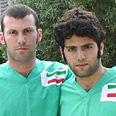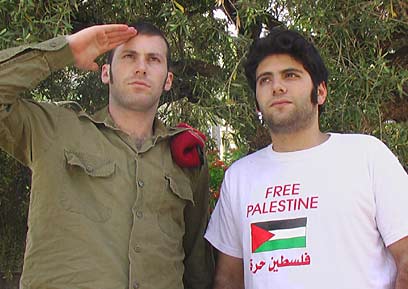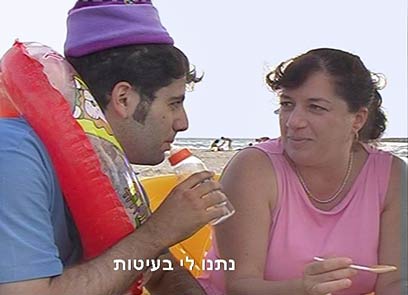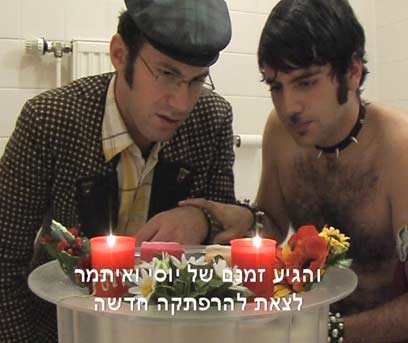
Satire gone wild
In their outrageously funny short satirical movies, Yossi Atia and Itamar Rose aim to expose Israel’s true face by breaking every taboo possible. From suicide bombings to the occupation, rape and homosexuality, no cow is sacred. Their mission, as they define it, is to make people look at their reality from a different angle
Many of the people pull out their wallets and contribute, not before they get a chance to specify which solution they prefer for the “Arab problem” – cages, eviction, or that a massive bomb be dropped on their houses.

Hilarious, yet thought-provoking (Photo: Ina Sander)
Watching these episodes on video, during a screening of other short satirical movies - as their creators prefer to define them - is a powerful experience. It arouses mixed feelings of amazement (at the Borat-style shamelessness of the makers), shock, and well – uncontrollable laughter.
No cow is sacred
Yossi Atia and Itamar Rose, two 27-year-old students who currently live in Tel Aviv, are behind this cinematic project, which as of late has been attracting more and more attention, mostly by word of mouth. Their short movies, which feature them in a variety of fictional characters alongside ‘real’ Israelis they meet or approach on the street, the mall or the park, target every burning issue this little country of ours has to offer.Atia and Rose seem especially fond of breaking taboos, in an attempt to make people take a fresh look at their reality and observe it from a different perspective. For them, no cow is sacred, and suicide bombings, the occupation, the war in Lebanon, bereavement, homosexuality and rape are just a few of the subjects with which they have dealt in their recent movies.
In one hilarious, and at the same time very disturbing, sketch, Atia and Rose, dressed as Arabs, approach picnicking families at a national park on Independence Day and ask them to stand with them for a moment of silence in memory of the Arab villages which used to be where the park is now, before their residents were expelled in 1967.
Despite the surreal situation, many people agree to cooperate. However, others respond with violent and racist remarks, and one says, “When all of you are dead, then I would be happy to stand for a moment of silence.”
Making people think
When asked what drives them and what the objective of the movies is, Atia and Rose sound more like political activists than artists or entertainers.Rose: If someone compares our movies to nonsense, then it annoys me… we don’t go out to film anything that we don’t care about or that we have nothing to say about. I think that in order to make people think, if you make them laugh then anything can come through.

Sketch filmed during Lebanon war. 'Mommy, I don't want to be a soldier' (Photo: Ina Sander)
Atia: It’s not about softening people up, it’s just goes straight into the heart. Laughing is a good thing, period. Although we deal with difficult subjects, we want to make people feel good… making people laugh is a sublime thing… because the Israeli audience is living this extreme reality, in order for this (the movies) to work, you have to be even more extreme.
The movies, according to Rose and Atia, aim at shaking people out of apathy and indifference.
Rose: What I think is that the people in Israel are so news-struck, that they have stopped actually seeing the news.
If we go to film near the (separation) wall or at a roadblock, then for the first time people will see the wall. When they watch it in the news they no longer really see it, but if they see something funny… then they will see this place for the first time and stop being indifferent towards it.
If we do something that speaks about suicide attacks, or death or Remembrance Day, when we ask people to read out their own will to the camera, the people themselves, for the first time, think about Remembrance Day, while they’re doing it their face changes, and for the first time they think about the meaning of this day.
Zionist propaganda power
Atia: Another thing is that Independence Day or Remembrance Day or the Sherutrom (annual fundraising day for the IDF), all the strong Zionist powers here have so much propaganda power. We don’t say what’s right and what’s wrong, we just want to expose the fact that this is propaganda.I think that the perviousness of the Israeli society to different ideas has really decreased, especially since the intifada… in some way we want to disrupt the way in which reality is viewed.

From the movie 'Finding Inga Blum'. Holocaust another good topic for satire (Photo: Dror Dayan)
Rose: For instance, when we went to wash Palestinians’ cars at a roadblock (as part of a movie titled “Machsom Wash” – A.H.)), people told us we may hurt the feelings of the people there. We tried telling them, ‘Do you realize that they are at the roadblock for six hours every day?’
What are your ‘red lines’? What topics are taboo?
Atia and Rose unanimously agree that there is no such thing, and claim there isn’t a subject they will steer clear from. They do, however, have some reservations.
Atia: We won’t do a movie about something that doesn’t interest us or that we have nothing to say about. We will prefer not to abuse people just for the sake of abuse or for it to be funny, but we will try to deal with places that have been penetrated by ideology.
What issue would you like to deal with next?
Rose: The issue that really disturbs me, and that we haven’t really figured out how to crack yet, is the issue of bereavement in Israel (in the context of parents to killed soldiers – A.H.). The fact that no one ever blames the parents, this I don’t like, that at the moment they lose a child, their sorrow becomes sacred, not their child.
If someone, like a reporter for instance, was protecting the child who died, he would ask the parents, “Why did you let him? You have now become stars, we have turned you into stars, we come to film you all the time, your child is no longer a star… now come and say to the camera, ‘I made a mistake and I have some responsibility for your death.’”
Atia and Rose hope to some day make money of the movies, which are now fully sponsored by them. They enjoy the help of friends, and wish that in the future they will be able to pay them.
When I comment that it’s doubtful that the television channels in Israel will be willing to purchase and air such materials, they laughingly suggest that perhaps al-Jazeera would be willing to pay.










